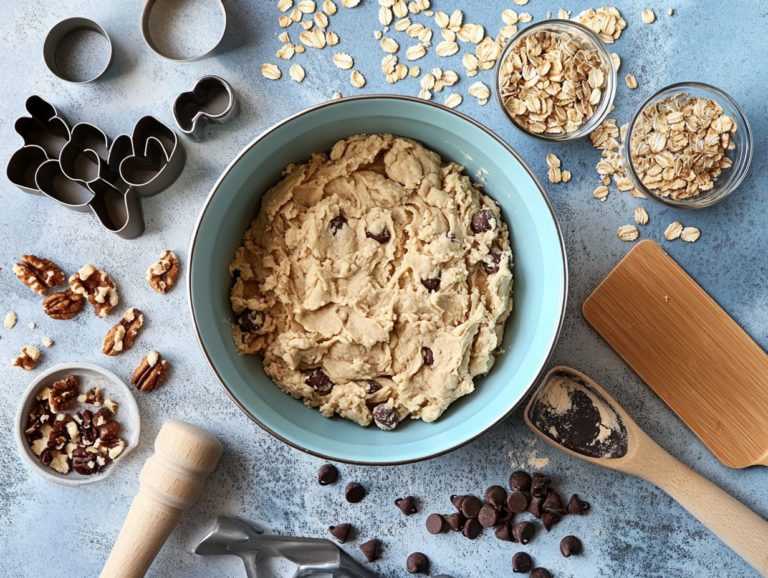How to Adapt Traditional Recipes for Plant-Based Cookies
Contents
- Delicious Plant-Based Cookie Recipes
- Key Takeaways:
- Understanding Ingredients in Traditional Cookies
- Substituting Non-Vegan Ingredients
- 2. Butter
- 3. Milk
- 4. Honey
- Tips for Baking Plant-Based Cookies
- 1. Use High-Quality Ingredients
- 2. Follow the Recipe Measurements
- 3. Adjust Baking Time and Temperature
- Delicious Plant-Based Cookie Recipes
- 4. Snickerdoodles
- 5. Lemon Sugar Cookies
- Frequently Asked Questions
- What are some common substitutes for traditional baking ingredients in plant-based cookie recipes?
- How can I make sure my plant-based cookies still have a chewy texture like traditional cookies?
- Are there any specific techniques I should use when adapting a traditional cookie recipe to be plant-based?
- Can I still use chocolate chips in my plant-based cookie recipe?
- Adjusting Baking Time and Temperature
Delicious Plant-Based Cookie Recipes
Cookies are a classic indulgence, best enjoyed warm from the oven. However, many traditional recipes often feature animal-based ingredients that don’t quite fit into a plant-based lifestyle. Embracing veganism opens up a world of delicious possibilities.
In this article, you’ll discover the essential elements that make classic cookies non-vegan, along with practical substitutions for common ingredients like eggs, butter, milk, and honey. You will also find invaluable tips to master plant-based baking techniques.
Prepare yourself to revel in exquisite plant-based cookie recipes that will please even the most discerning sweet tooth!
Key Takeaways:
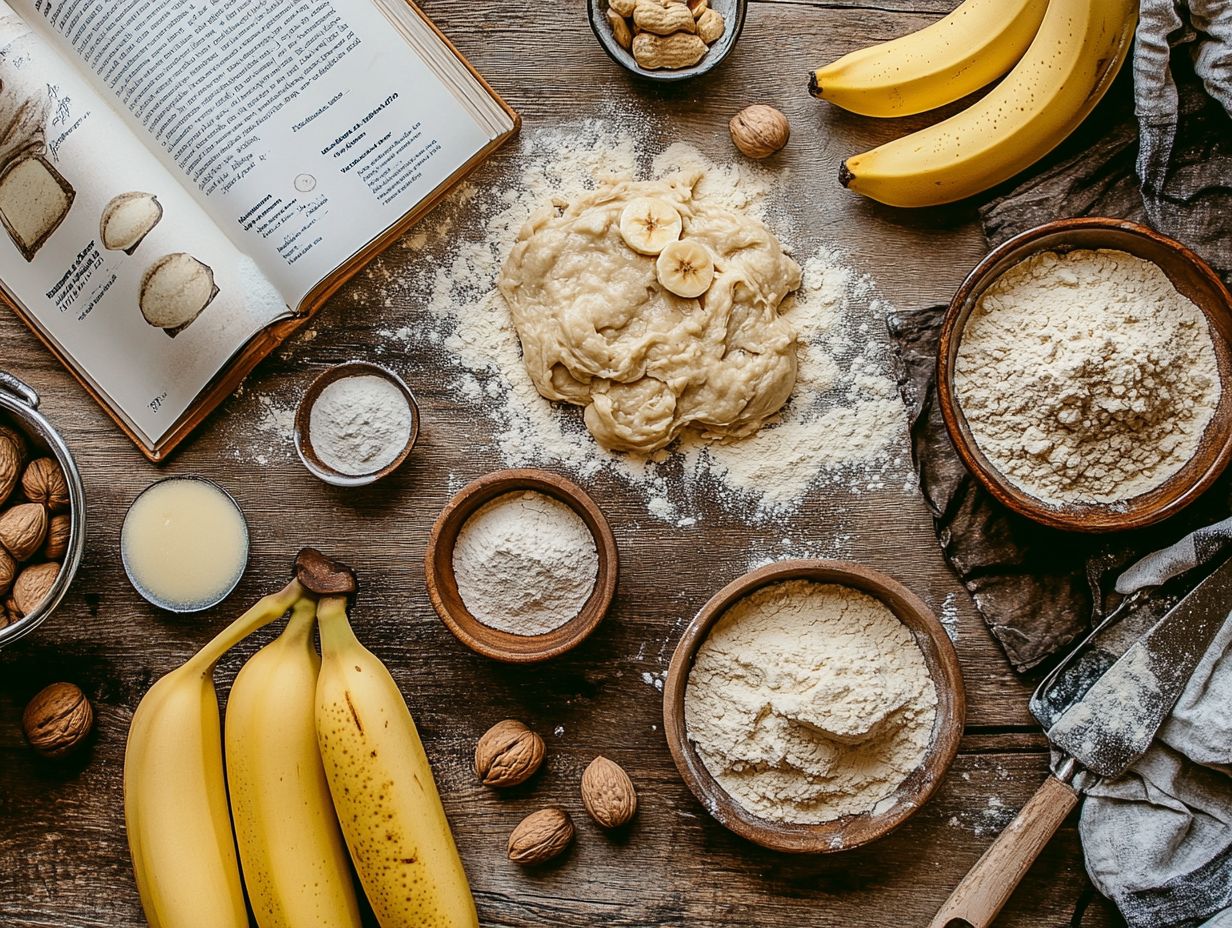
- You can adapt traditional cookie recipes for a plant-based diet by substituting non-vegan ingredients such as eggs, butter, milk, honey, and other dairy products with plant-based alternatives like almond milk, vegan butter, and flaxseed meal.
- Use high-quality ingredients, including plant-based oils like olive oil or canola oil. Follow recipe measurements for the best results when baking plant-based cookies. Incorporating natural sweeteners like maple syrup or agave can enhance flavors.
- Adjust baking time and temperature to ensure the perfect texture and flavor of your plant-based cookies.
Understanding Ingredients in Traditional Cookies
Understanding the ingredients in traditional cookies is crucial for anyone venturing into baking, particularly if you’re considering plant-based alternatives. Traditional cookies typically rely on essential components like flour, sugar, butter, eggs, and chocolate chips, each contributing to their distinct textures and flavors.
These ingredients can pose challenges for those following a vegan diet, potentially narrowing the choices for delicious treats. In this section, you’ll explore traditional ingredients, uncovering their roles in cookie baking while discovering innovative substitutes that align with a plant-based lifestyle, such as coconut sugar, vegan butter, and chickpeas.
This way, everyone can indulge in sweet treats without compromise.
What Are the Key Ingredients in Traditional Cookies?
The essential ingredients in traditional cookies typically include flour, sugar, butter, eggs, and chocolate chips, each playing a pivotal role in achieving that perfect balance of sweetness and texture. Flour provides the necessary structure, while sugars offer sweetness and moisture. Butter adds a rich creaminess, and eggs bind everything together seamlessly. Of course, chocolate chips often steal the spotlight, infusing irresistible flavors that make cookies delightful.
Understanding these components is key to mastering cookie baking, whether you re whipping up classic recipes or experimenting with innovative plant-based versions. The type of flour you choose can greatly influence your final product. All-purpose flour reigns supreme for its versatility, while whole wheat flour introduces a nuttier flavor and denser texture that some may find appealing.
Various sugars create unique profiles: granulated sugar delivers a crispier cookie, brown sugar lends a chewier texture with lovely caramel undertones, and coconut sugar introduces a subtle flavor twist. For chocolate chip enthusiasts, selecting between semi-sweet, dark, or even dairy-free chips can significantly elevate the taste experience.
If you’re steering clear of animal products, you can easily substitute eggs with flaxseed meal or applesauce, ensuring that everyone can savor the joy of freshly baked cookies without sacrificing flavor or texture. Additionally, incorporating pumpkin puree or silken tofu can offer unique textures and moisture for your vegan cookies.
Get ready to enjoy these delicious cookie recipes, perfect for everyone!
What Makes These Ingredients Non-Vegan?
The presence of certain ingredients in traditional cookies, such as dairy products and eggs, clearly categorizes them as non-vegan, rendering them unsuitable for anyone following a vegan diet. Butter, prized for its rich flavor and texture, comes from milk, while eggs are essential for binding and moisture two critical elements for cookie structure.
By understanding these non-vegan components, you can identify where substitutions are necessary. This will help you find delicious plant-based alternatives that maintain both taste and texture. For instance, vegan butter and chickpea brine (the liquid from canned chickpeas), known as aquafaba, are excellent egg replacers that can be found in your pantry.
These ingredients not only conflict with vegan principles but also raise health concerns for some individuals. Dairy can contribute to lactose intolerance and potential allergies. Eggs are often associated with cholesterol issues and are a common allergen. Substitutes like coconut milk, almond milk, and flaxseed meal offer healthier options that adhere to a plant-based diet.
Several plant-based substitutes are available to you. For example, vegan butter serves as an outstanding alternative, delivering that creamy consistency without any dairy. A flaxseed egg replacer created by mixing ground flaxseeds with water can effectively mimic the binding properties of eggs. This ensures that your cookies retain their delightful structure. Plant-based milk like oat milk or coconut milk can also enhance the moisture and flavor of your vegan cookies.
By utilizing these substitutes, you can craft delectable vegan treats that appeal to health-conscious consumers without compromising on flavor. Integrating ingredients like nut butter, olive oil, and natural sweeteners can bring additional health benefits to your baking.
Substituting Non-Vegan Ingredients
Substituting non-vegan ingredients is crucial for crafting delectable plant-based cookies that appeal to those embracing a vegan lifestyle. This way, everyone can indulge in the delightful flavors of baking without compromising their dietary values. You’ll find a variety of vegan egg replacers, plant-based oils, and natural sweeteners that can be sourced directly from your pantry, ensuring your recipes remain both delicious and nutritious.
By grasping the roles of traditional ingredients like eggs, butter, milk, and honey, you can discover effective substitutes that not only preserve the desired taste and texture but also enhance the health benefits of your creations. Whether you opt for flaxseed meal as an egg replacer or coconut oil in place of butter, these alternatives will elevate your baking while staying true to vegan principles.
Adding ingredients like pumpkin puree or chickpea brine (aquafaba) can also offer unique flavors and textures to your plant-based cookies.
1. Eggs
Eggs play a vital role as a binding agent in baking, but if you’re aiming to whip up some vegan cookies, fear not there are several effective egg replacers that will keep your recipe intact. One of the most popular substitutes is flaxseed meal mixed with water. When combined, it forms a gel-like consistency that beautifully mimics the binding properties of eggs.
You might also explore options like chia seeds, applesauce, or even silken tofu; each of these alternatives brings its own unique benefits and flavors to your plant-based masterpieces. For instance, if you mix one tablespoon of flaxseed meal with two and a half tablespoons of water, you ve got a perfect replacement for a single egg.
This blend not only binds your ingredients together but also adds a delightful nutty flavor that enhances the overall taste. Chia seeds can also do the trick, used at a 1:3 ratio one tablespoon of chia seeds mixed with three tablespoons of water serves the same purpose.
When you opt for applesauce, just a quarter cup can replace one egg, infusing moisture and sweetness that s particularly delightful in cookie recipes. Silken tofu, when blended until smooth, is another fabulous binder; about one-quarter cup will suffice for one egg, adding creaminess without significantly altering the flavor.
Pumpkin puree can also be used as a binding agent, providing additional moisture and a unique flavor profile to your vegan cookies. To seamlessly incorporate these substitutes into your cookie recipes, consider adjusting the wet and dry ingredients to achieve the ideal consistency. This way, you can ensure that your cookies emerge soft and chewy without sacrificing taste.
2. Butter
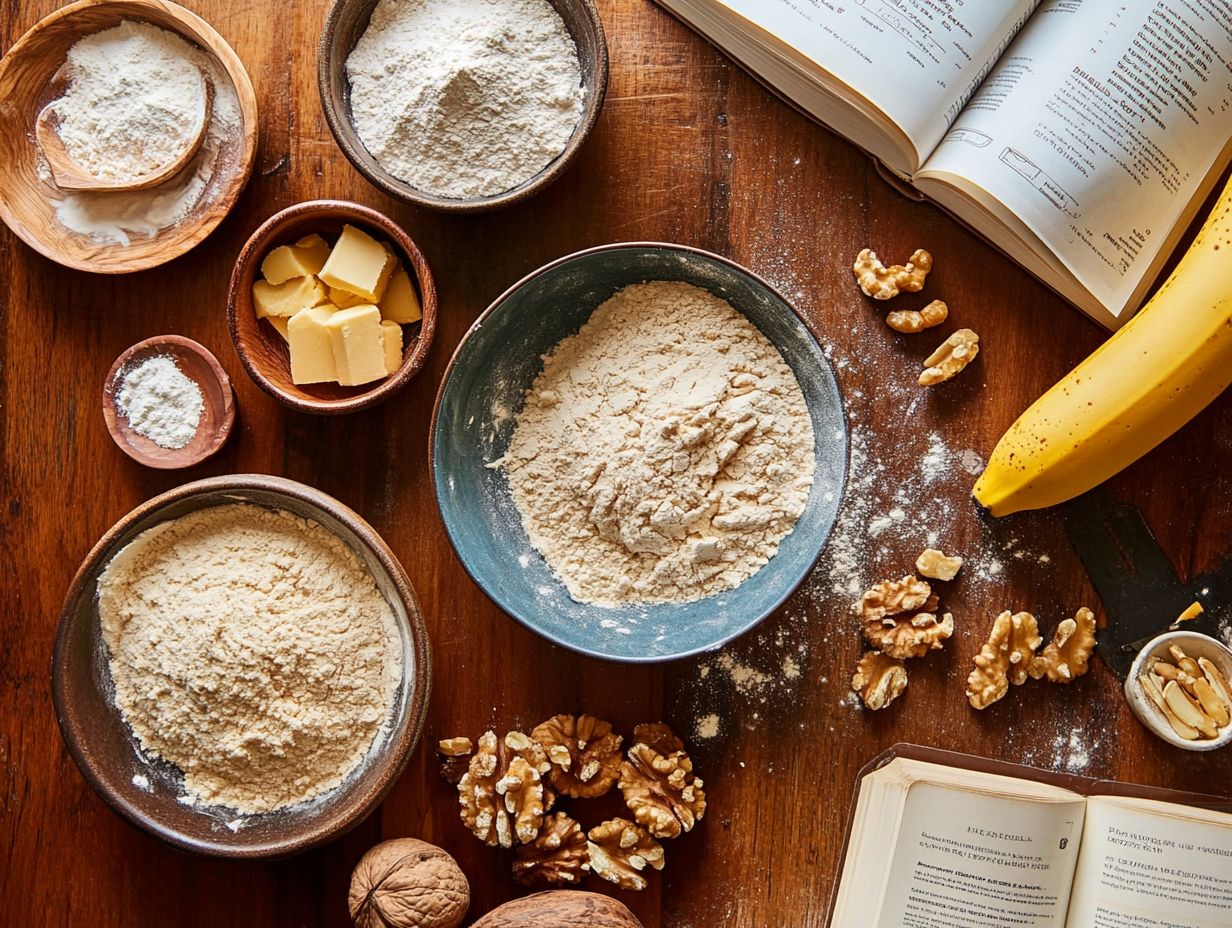
Butter is a classic hero in traditional cookies, renowned for its rich flavor and texture. If you’re embracing a vegan lifestyle, a world of substitutes awaits that can yield equally delightful results. Vegan butter, coconut oil, and nut butters like almond or cashew can provide the moisture and richness you desire while enhancing the overall flavor profile of your baked goods. Other plant-based oils, such as olive oil or canola oil, can also serve as excellent substitutes in your vegan recipes.
Each of these alternatives brings its unique flair to your cookies, opening the door for experimentation and creativity in your kitchen. Using different plant-based milks like coconut milk or almond milk can create diverse and delightful flavors in your baking.
Take vegan butter, for instance. It is similar in texture to dairy butter and delivers a taste that can result in wonderfully soft cookies. Coconut oil, on the other hand, introduces a delightful hint of sweetness and a tropical undertone. However, be mindful it can make your cookies a touch crumblier unless you pair it with a suitable binder.
Then there are nut butters, which can add a creamy richness and a distinct nuttiness to your treats. Using them may require you to adjust your sugar ratios for the perfect balance.
When substituting these fats in your recipes, aim for a straightforward 1:1 ratio when using vegan butter. For oils, you might want to slightly reduce the amount to maintain the ideal texture. Ensure that your final mixture is well-blended to achieve that coveted cookie dough consistency.
3. Milk
In traditional cookie recipes, milk serves as a crucial ingredient for moisture and flavor. If you’re embracing a vegan lifestyle, you’ll find that plant-based milk alternatives like almond milk, coconut milk, and oat milk are superb substitutes. These alternatives not only enhance the taste and texture of your cookies but also provide essential nutrients. Each of these options can be seamlessly integrated into your recipes, ensuring your baked goods remain irresistibly moist and delicious.
As you navigate the world of plant-based milks and veganism, it s essential to pay attention to their unique flavors and consistencies. Almond milk offers a subtly nutty flavor, making it an excellent match for chocolate chip cookies. Meanwhile, oat milk adds a creaminess that beautifully elevates oatmeal cookies. Don’t overlook coconut milk; its tropical undertones can create an enticing contrast in peanut butter cookies. The health benefits of these alternatives also make them an excellent choice for anyone following a vegan diet.
To achieve the ideal cookie dough texture, a good rule of thumb is to substitute non-dairy milk at a one-to-one ratio, adjusting slightly if you desire a thicker consistency. Embracing these diverse options invites you to get ready for fun and tasty baking adventures! Additionally, consider using olive oil or canola oil as substitutes for traditional baking oils, which can influence the consistency and flavor of your cookies.
4. Honey
Honey is a natural sweetener often found in baking. However, if you’re embracing a vegan lifestyle, you have plenty of alternatives that provide sweetness without compromising your dietary choices. Various sweeteners, such as agave or date syrup, can be used as substitutes, adding rich flavors to your desserts.
Agave syrup and maple syrup serve as excellent substitutes. They add both depth of flavor and moisture to your plant-based cookies, ensuring they remain delightful and indulgent. These vegan sweeteners can be easily integrated into your recipes, allowing you to enjoy the same level of sweetness while adhering to your vegan principles. Using coconut sugar as an alternative to regular sugar enhances the richness of your recipes.
Besides agave and maple syrups, you might also consider date syrup. It offers a rich, caramel-like flavor and is packed with nutrients, making it a smart choice for health-conscious bakers. Don t overlook coconut nectar; its low glycemic index means it causes a slower rise in blood sugar levels, bringing a subtle sweetness that beautifully complements tropical flavors. Flaxseed can also serve as a nutritious egg replacer in your baking.
When using these sweeteners, it s essential to adjust the quantities, as their sweetness levels can vary. For example, agave syrup is sweeter than honey, so you ll need to reduce the volume accordingly. This adaptability preserves the desired sweetness and enhances the overall flavor profile of your baked goods, ensuring everyone can indulge in mouthwatering treats without sacrificing their dietary preferences.
Tips for Baking Plant-Based Cookies
When baking plant-based cookies, a few key tips can elevate your results, delighting both vegans and non-vegans alike. Incorporating techniques that focus on maintaining flavors and textures can make a significant difference.
First and foremost, prioritize high-quality ingredients; they play a pivotal role in enhancing both flavor and texture. Be meticulous with your recipe measurements to ensure that your cookies bake evenly. Adjust the baking time and temperature as needed to avoid the pitfalls of overcooking or undercooking. Using baking soda can also help achieve the desired texture in your cookies.
By embracing these strategies, get ready to craft irresistible cookies that everyone will love! Experimenting with egg replacers like chickpeas can add an interesting twist to your recipes.
1. Use High-Quality Ingredients
Using high-quality ingredients is crucial for baking exceptional plant-based cookies. The quality of each component profoundly impacts the final product’s flavor and texture. By opting for organic or premium brands of flour, sweeteners like coconut sugar, and high-grade plant-based butter, you can elevate your cookies to new heights, ensuring that every bite is rich in taste and utterly satisfying.
Selecting the best ingredients enhances overall quality and aligns beautifully with the principles of a health-conscious vegan diet.
To create the most delectable plant-based treats, be discerning when choosing each ingredient. Seek out local markets, farmer s markets, or specialty stores where you can discover artisanal products that reflect quality and care in their production.
Brands like Bob’s Red Mill and Earth Balance stand out for their commitment to superior plant-based offerings, making them reliable choices for your pantry. For sourcing nut butters or chocolate, look to brands like Justin’s or Enjoy Life, which prioritize quality and flavor. Adding pumpkin to your recipes can also bring a unique flavor dimension.
By investing your time in selecting the finest ingredients, your baking experience will be more enjoyable, and the results will be undeniably impressive.
Dive into the world of plant-based baking and impress your friends with these delicious recipes!
2. Follow the Recipe Measurements
Following the recipe measurements accurately is absolutely essential in baking, particularly when you re whipping up plant-based cookies. Precision plays a pivotal role in determining the outcome; each ingredient serves a specific purpose. Even the slightest deviation can lead to cookies that are either too dry, too soggy, or entirely devoid of flavor.
By sticking to the recommended measurements, you ensure that your plant-based cookies come out just the way you intended. This allows you to fully savor their delightful taste and texture.
Take, for example, the substitution of all-purpose flour with almond flour. It s crucial to maintain a ratio of about 1:1.25. This means that for every cup of all-purpose flour, you ll need approximately 1.25 cups of almond flour to achieve that perfect consistency.
In terms of using plant-based milk in place of dairy milk, a straightforward 1:1 substitution generally works well. However, it s wise to check the viscosity to ensure you re on the right track.
To elevate your baking experience and achieve the most accurate results, consider investing in high-quality kitchen scales or measuring cups. This way, you can measure your ingredients with the precision needed to craft perfect cookies every single time.
3. Adjust Baking Time and Temperature
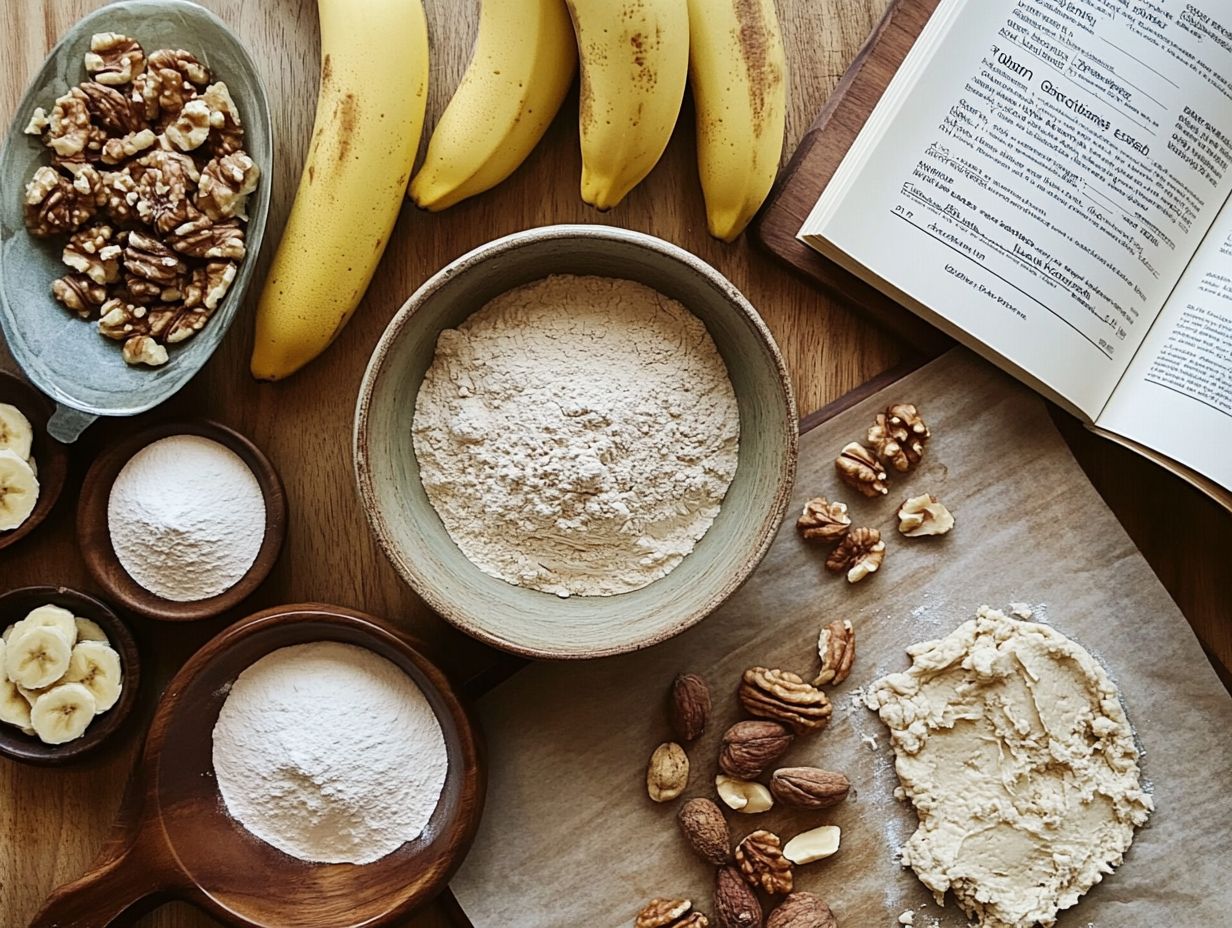
Adjusting the baking time and temperature will completely elevate your cookie-baking adventure! Every oven has its quirks, influencing how your cookies rise and brown. It s crucial to keep a close watch on your cookies as they bake, especially in those final moments, to ensure you achieve the desired level of doneness.
Don t miss the chance to savor your perfectly baked cookies! Experiment with minor adjustments in time and temperature; this will help you discover the perfect balance that consistently yields delicious results.
Several factors come into play when determining how long and at what temperature your cookies should bake. Consider the type of oven whether it s a conventional oven, which uses heat from the bottom, or a convection oven, which circulates hot air for even baking as well as the size and thickness of your cookie creations.
For example, larger or thicker cookies might need a bit more time, whereas smaller ones will likely bake faster. A gentle tap on the edges of the cookie can offer insight into doneness; they should feel slightly firm yet remain soft in the center.
Making small tweaks, like elevating the temperature by 25 degrees or trimming a couple of minutes from the bake time, can greatly enhance the texture and flavor of your cookies. These subtle adjustments can ensure that your cookie-baking experiences are nothing short of extraordinary.
Delicious Plant-Based Cookie Recipes
Exploring delightful plant-based cookie recipes enables you to savor sweet treats without sacrificing your dietary preferences. These recipes present an array of flavors and textures that are sure to please everyone.
Whether you’re in the mood for classic chocolate chip cookies or eager to experiment with inventive variations featuring ingredients like pumpkin or nut butters, these creative plant-based cookie variations highlight the remarkable versatility of plant-based baking.
Each recipe is crafted to be straightforward and approachable, ensuring you can whip up delectable desserts that not only satisfy your cravings but also leave your friends and family thoroughly impressed. So, why wait? Try these recipes now to experience delicious plant-based treats!
1. Classic Chocolate Chip Cookies
Classic chocolate chip cookies are a beloved favorite. By using plant-based ingredients, you can craft a vegan version that rivals the original in taste and satisfaction. This recipe calls for high-quality flour, coconut sugar, vegan butter, and dairy-free chocolate chips to ensure that every bite is rich and mouthwatering.
With the right techniques and premium ingredients, these cookies will impress everyone, demonstrating that plant-based baking can be both indulgent and delightful. You might even consider using canola oil or olive oil for a different take on traditional recipes.
Ingredients
- 1 cup of high-quality flour
- 1 cup of coconut sugar
- 1/2 cup of vegan butter
- 1 cup of dairy-free chocolate chips
- 1/2 teaspoon of baking soda
- 1/4 teaspoon of salt
- 1 teaspoon of vanilla extract
Instructions
To achieve the perfect texture, it s essential to follow a few key baking techniques. Start by mixing the vegan butter and coconut sugar together until the mixture is light and fluffy; this is what creates that soft center you crave. Chilling the dough for at least 30 minutes before baking will enhance the flavor and texture, preventing the cookies from spreading too much in the oven.
When it comes to chocolate, choosing high-quality dairy-free chips will deliver bursts of rich chocolate in each bite, rendering these cookies utterly irresistible.
Now, let s jump right into this delicious recipe that will surely wow your taste buds!
2. Peanut Butter Cookies
Peanut butter cookies are a delightful option that you can easily transform into a plant-based treat without compromising on flavor or texture. Imagine the nutty richness that will soon become irresistible!
This recipe features creamy natural peanut butter paired with coconut flour and maple syrup, resulting in cookies that are both sweet and downright satisfying.
Ingredients
- 1 cup of natural peanut butter
- 1/2 cup of maple syrup
- 1 cup of coconut flour
- 1 teaspoon of vanilla extract
Instructions
Quick to prepare and perfect for any occasion, these cookies are guaranteed to impress anyone in search of a delightful indulgence. Simply mix the peanut butter and maple syrup together, then mix in the coconut flour and vanilla until a dough forms.
Drop tablespoon-sized mounds of cookie dough onto a baking sheet and bake at 350 F (175 C) for about 10-12 minutes. For additional flavors, consider using chocolate chips or experimenting with different sweeteners like agave or coconut sugar.
If you wish to elevate your treats further, add a handful of vegan chocolate chips or switch to almond or cashew butter for a unique twist that introduces new layers of flavor. You can also try incorporating other nut butters or using olive oil as an alternative fat source.
3. Oatmeal Raisin Cookies
Oatmeal raisin cookies are a timeless delight that adapts seamlessly to a vegan diet, offering a hearty and wholesome option that’s both chewy and bursting with flavor.
This recipe invites you to enjoy rolled oats, coconut sugar, and plump raisins, creating a delightful combination that s sure to satisfy your sweet tooth.
Ingredients
- 1 cup of rolled oats
- 1/2 cup of coconut sugar
- 1/2 cup of plump raisins
- 1/4 cup of vegan butter
- 1/2 teaspoon of cinnamon
- 1/4 teaspoon of salt
- 1 teaspoon of vanilla extract
Instructions
These cookies harness the goodness of oats, which are rich in fiber and celebrated for their cholesterol-lowering properties, promoting heart health. The addition of raisins introduces a natural sweetness while delivering a boost of iron and antioxidants.
Using flaxseed as an egg replacer enhances their health benefits further. To elevate this treat even more, consider incorporating chopped nuts like walnuts or almonds for that satisfying crunch, or sprinkle in chia seeds or flaxseeds to infuse them with an extra dose of omega-3 fatty acids.
The versatility of this recipe allows you to adjust ingredients to match your dietary needs or personal preferences, ensuring that every batch is uniquely yours. Adding a touch of pumpkin puree can also introduce a new dimension of flavor and moisture.
Give these cookies a try and share your favorite variations!
4. Snickerdoodles
Snickerdoodle cookies, with their signature cinnamon sugar coating, can be effortlessly transformed into a vegan delight. This recipe uses plant-based butter, coconut flour, and a thoughtful blend of spices to replicate the traditional flavor and texture you cherish.
Perfect for a cozy afternoon snack, these cookies embody the essence of home baking and are bound to become a favorite among your family and friends. Experiment with different baking techniques to achieve the perfect texture.
The unique flavor profile of cinnamon truly shines through, enhancing the sweet yet slightly tart nature of the cookie. When these ingredients come together, they create a rich treat that beautifully balances indulgence with health.
You can also try incorporating alternative flours like almond meal to add a nutty flavor and texture. To achieve that perfect texture, it s essential to cream the butter and sugar until fluffy, ensuring you don t overmix the cookie dough.
This technique allows for the ideal chewy edges and a soft center that you crave. Feel free to experiment with various types of plant-based milks to add an intriguing twist, and don t underestimate the power of a touch of nutmeg to elevate those warm spices even further.
These cookies will undoubtedly be a delightful addition to any dessert table you create! Using canola oil as a fat substitute can also enhance the texture and flavor.
5. Lemon Sugar Cookies
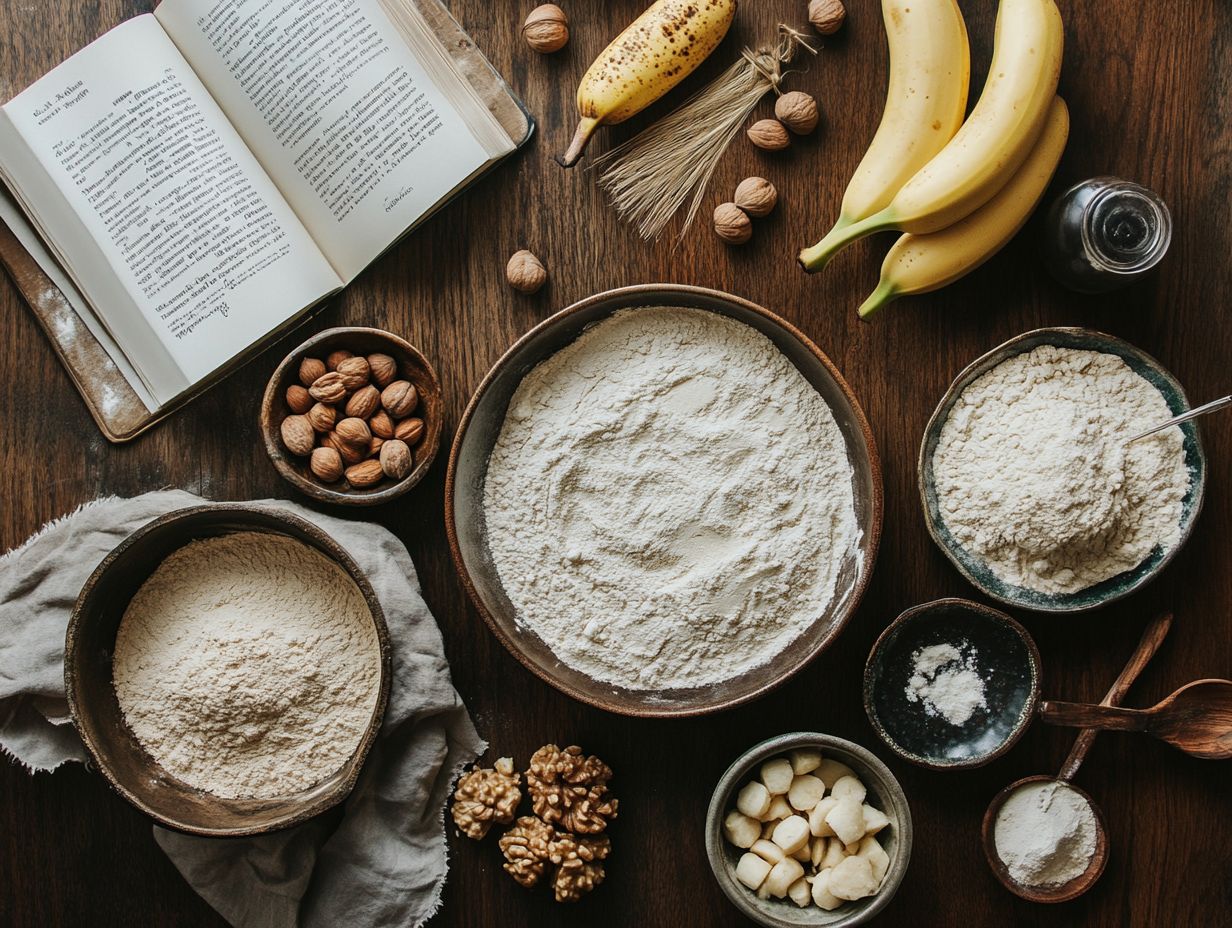
Lemon sugar cookies are a refreshing twist on the traditional cookie, and when you make them vegan, they deliver a bright burst of flavor that s perfect for any occasion. This recipe calls for zesty lemon juice and zest, combined with plant-based ingredients that result in cookies that are light and tangy.
Ideal for your spring and summer gatherings, these cookies are as stunning as they are delicious. Incorporate some coconut milk to add extra creaminess.
The vibrant flavor of citrus elevates the sweets and adds a layer of complexity that transforms a simple cookie into a gourmet treat. To achieve the perfect balance of sweetness and tartness, the lemon juice harmonizes beautifully with the sugar, letting the natural flavors shine through without overwhelming your palate.
If you love a burst of flavor, this recipe offers a delightful way to incorporate refreshing citrus into your dessert repertoire. Follow these steps to create the most scrumptious vegan lemon sugar cookies, and watch them become your go-to treat this season!
Frequently Asked Questions
Some common substitutes for traditional baking ingredients in plant-based cookie recipes include flaxseed or chia eggs for eggs, coconut oil or vegan butter for butter, and plant-based milk for dairy milk. You can also use agave syrup or maple syrup as sugar substitutes.
To maintain a chewy texture in plant-based cookies, you can use a combination of mashed bananas and almond butter as a binding agent. Adding a small amount of cornstarch to your dough can also help. A bit of baking soda can enhance the texture.
One important technique is to ensure your dough is slightly chilled before baking, as this helps the cookies hold their shape and prevents spreading.
Yes, you can still use chocolate chips in your plant-based cookie recipe! Look for vegan chocolate chips, which are typically made with dairy-free ingredients. You can also use dark chocolate chunks for a richer flavor.
Try baking these delicious cookies today and impress your friends and family!
Adjusting Baking Time and Temperature
If you use plant-based substitutes in a traditional cookie recipe, reduce the baking time slightly. Lower the temperature by about 25 degrees Fahrenheit. Understanding the methods for baking specific to vegan desserts can help you perfect your cookies.
Get ready to elevate your plant-based cookies! Some unique ingredients to try are tahini, almond meal, or mashed avocados, which add richness and flavor. You can also use different oils like canola or olive oil to vary textures and tastes.
You can also add chickpeas for extra protein and a unique texture.






